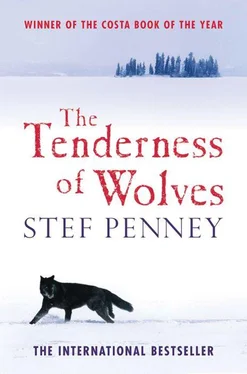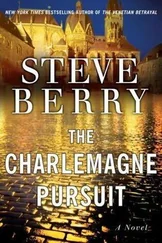Sturrock falls uncharacteristically silent. He has had to deal with many shocks in his long career, and his mind is already working out the repercussions of this news. Tragic, obviously, for Jammet. Worrying, at the least, for him. For there is unfinished business there that he has been very keen to conclude, awaiting only the financial means to do so. Now that Jammet is dead, the business must be concluded as soon as possible, otherwise the chance may slip out of his reach for good.
He must have looked very shocked indeed, because the next time he looks down there is a cup of coffee and a chaser of bourbon standing on his table. The commercial travellers are looking at him with great and genuine interest–a violent and dreadful piece of news is exciting enough, but to stumble across someone directly affected by the tragedy–what could be better? It is worth several dinners in cold currency. Sturrock accordingly reaches out with a trembling hand for the liquor.
‘You look like someone walked over your grave all right,’ remarks one of them.
Realising what is required of him, Sturrock hesitatingly tells a sad tale of a present promised to his sick wife, and a debt unpaid. He is not in fact married, but the travellers do not seem to mind. At one point he leans on the table, his eyes following a plate of chops on their way past, and two minutes later a hot roast dinner lands in front of him. Really, he thinks (not for the first time), he missed his vocation–he should have been a writer of romances, the ease with which he conjures the consumptive wife. When at last he feels he has given them their money’s worth (no one could accuse him of not being generous with his imagination), he shakes them both by the hand and leaves the coffeehouse.
It is late afternoon and the day is fleeing over the western horizon. He walks slowly back to his lodgings, his mind working out how he is going to find the cash for a trip to Caulfield, for that is what he will have to do, to keep his dream alive.
There is probably one person left in Toronto whose patience he has not entirely exhausted, and if he approaches her in the right way, she might be good for a loan of twenty dollars or so. Accordingly he turns his footsteps right at the end of Water Street and heads towards the more salubrious districts along the lake shore.
When I could no longer pretend it was night–long after the sun came up–I gave in to exhaustion and climbed upstairs to bed. Now it must be midday but I can’t get up. My body refuses orders, or rather my mind has given up issuing them. I stare at the ceiling, mired in the certainty that all human endeavour, but especially mine, is futile. Francis has not come home, thus adding weight to the argument that I am utterly without talent, courage or use. I am anxious for him, but my concern is overwhelmed by the inability to take a decision to do anything. I am not surprised he has run away from such a mother.
Angus got up just as I was coming upstairs, and not a word was said. We have had difficult conversations about Francis before, although not under such dramatic circumstances. Angus tends to repeat that he is seventeen and can look after himself; it is normal for boys of his age to take off for days on end. But he is not like normal boys, I try not to say, but in the end always do. The unspoken words press on me in the small room: Francis is gone; a man is dead. Of course there can be no connection.
A voice in my head wonders if Angus would not grieve too much if Francis did not come back. Sometimes they look at each other with such venom, like sworn enemies. A week ago Francis came in late and refused to do one of his chores. He would do it in the morning, he said, treading on thin ice as Angus had just had a fruitless argument with James Pretty over the boundary fence. Angus took a breath and told him just what a selfish, ungrateful youth he was. When he said the word ungrateful I knew what was coming. Francis exploded: Angus expected him to be grateful for giving him a home; he treated him as an indentured servant; he hated him and always had … Angus withdrew into himself, betraying nothing but a thin glimmer of contempt that chilled me. I shouted at Francis then, my voice trembling. I wasn’t sure how much he included me in his anger; it was so long since he had looked me in the eye.
How could I have prevented it coming to this? Probably Ann is right to deride me; I am incapable of raising a family, even though I used to despise women who thought it was all that mattered. Not that I have produced anything else of worth.
A sort of waking dream haunted me through my vigil; I had been reading a gothic story about an artificial man who hated the world because his appearance inspired terror and loathing. At the end of the novel the creature ran away to the Arctic where no one could see him. In night-induced delirium I saw Francis being pursued, like the monster, who is a murderer … In daylight I can see how silly this was; Francis can’t even kill a trout. At the same time, he has been gone for two days and nights.
Something occurs to me in the tangle of sheets, and eventually forces me to go into Francis’s room and pick through the chaos. It is hard to tell what is there and what is gone, so it takes me some time to find what I am looking for. When I do, I go into a frenzy, pulling things out of cupboards, scrabbling under the bed and then tearing through the rest of the house in a desperate search. But it is no good–because I am praying for things not to be there when they irrefutably are. I find his two fishing rods and the spare rod Angus made for him when they were still on speaking terms. I find tinder-boxes and sleeping blankets. I find all the things he would have taken on a fishing trip. The only things missing are a set of clothes and his knife. Without thinking I take his favourite fishing rod out the back and break it in two, and bury the halves in the woodpile. When I have done that I am breathing heavily. I feel guilty and dirty, as if I have accused Francis myself, so I go inside and boil pans of water for a bath. Luckily I don’t get into the tub straight away, for Ann Pretty marches into the kitchen without even a knock.
‘Ah, Mrs Ross, what a life of leisure you lead! Bathing in the middle of the day … You ought to be careful with hot baths at your age. My sister-in-law had a seizure in her bath, you know.’
I do know, as she has told me at least twenty times. Ann likes to remind me that she is three years younger than I, as though this were a whole generation. For my part I refrain from pointing out that she looks older than her years and is shaped like a bear, whereas I have kept my figure and was thought, in my youth at least, something of a beauty. She wouldn’t care anyway.
‘Did you hear they are investigating? They have brought in Company men. A whole troop. They are asking questions up and down the river.’
I nod, non-committal.
‘Horace came up from the MacLarens’ and said they’d been there talking to everyone. I expect they’ll be here soon.’ She looks around her in a predatory fashion. ‘He said Francis hasn’t been around since yesterday morn.’
I don’t bother to correct her and say it was longer than that. ‘He’ll get a shock when he comes back,’ I say.
‘Didn’t he hunt with Jammet?’ She looks sly, her eyes raking the room like a bird of prey; a rosy-faced, broad-beamed buzzard, looking for carrion.
‘A few times. He’ll be sad when he finds out. They weren’t great friends, though.’
‘What a business. What are we all coming to? Still, he was a foreigner. They’re hot-blooded, Frenchies, aren’t they? I know when I lived in the Sault they were always at each other’s throats. I expect it was one of them come to do business.’
She is not going to accuse Francis to my face, but I can imagine her doing so elsewhere. She has always thought of him as a foreigner too, with his dark hair and skin. She considers herself a well-travelled woman, and from each place she has been to, she has brought away a prejudice as a souvenir.
Читать дальше












